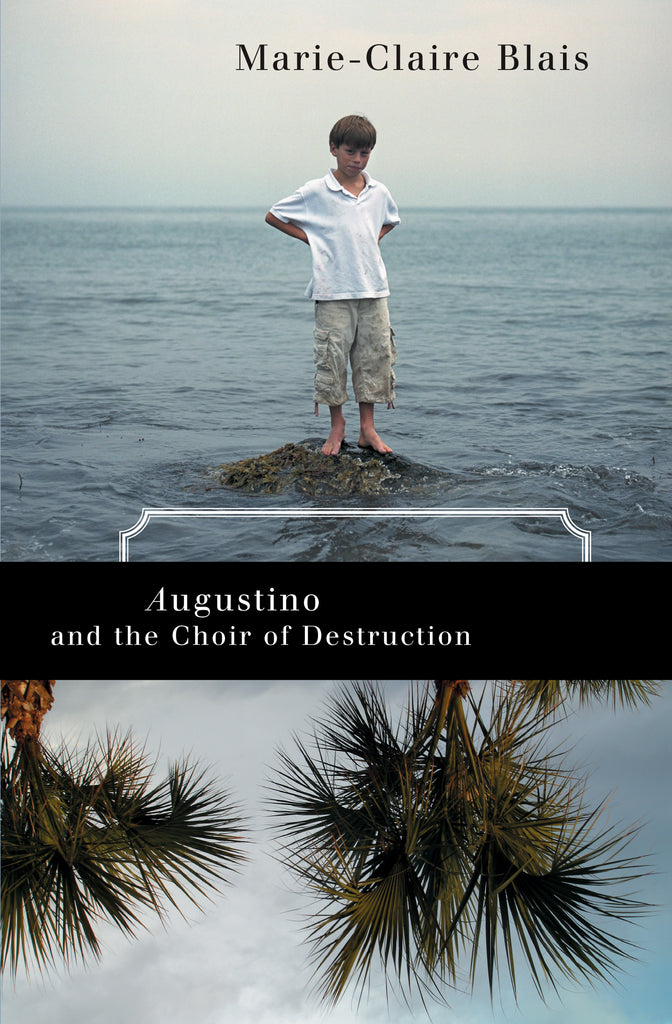In Augustino and the Choir of Destruction literary legend and three-time winner of the Governor General's Literary Award Marie-Claire Blais delivers the third volume in the prize-winning series (These Festive Nights, Thunder and Light, Augustino and the Choir of Destruction, and Rebecca, Born in the Maelstrom) acclaimed as one of the greatest undertakings in modern Quebec fiction.
Augustino and the Choir of Destruction is set on an island in the Gulf of Mexico that is home to the full spectrum of humanity: the rich, the poor, the powerful, the humble, artists, criminals. With her unique, signature use of punctuation, Marie-Claire Blais manages to brilliantly show in one flashing stroke men and women; victims and tormentors; child kamikaze pilots and petty thieves from Bahama Street; Charles, a great poet cut down by AIDS; Cinderella, a transvestite prostituting himself to a customer at the Porte du Baiser saloon; Caroline, an artist and photographer who has seen all the hidden treasures of the world; and Augustino, a clairvoyant child-writer. These individual destinies combine in Blais' vision to form a single harmonic texture.
In Augustino and the Choir of Destruction literary legend and three-time winner of the Governor General's Literary Award Marie-Claire Blais delivers the third volume in the prize-winning series (These Festive Nights, Thunder and Light, Augustino and the Choir of Destruction, and Rebecca, Born in the Maelstrom) acclaimed as one of the greatest undertakings in modern Quebec fiction.
Augustino and the Choir of Destruction is set on an island in the Gulf of Mexico that is home to the full spectrum of humanity: the rich, the poor, the powerful, the humble, artists, criminals. With her unique, signature use of punctuation, Marie-Claire Blais manages to brilliantly show in one flashing stroke men and women; victims and tormentors; child kamikaze pilots and petty thieves from Bahama Street; Charles, a great poet cut down by AIDS; Cinderella, a transvestite prostituting himself to a customer at the Porte du Baiser saloon; Caroline, an artist and photographer who has seen all the hidden treasures of the world; and Augustino, a clairvoyant child-writer. These individual destinies combine in Blais' vision to form a single harmonic texture.
| Published By | House of Anansi Press Inc — May 1, 2007 |
| Specifications | 232 pages | 5.38 in x 8 in |
|
Supporting Resources
(select item to download) |
Excerpt |
| Written By |
MARIE-CLAIRE BLAIS is the internationally revered author of more than twenty-five books, many of which have been published around the world. In addition to the Governor General's Literary Award for Fiction, which she has won four times, Blais has been awarded the Gilles-Corbeil Prize, the Médicis Prize, the Molson Prize, and Guggenheim Fellowships. She divides her time between Key West, Florida, and Quebec. |
| Written By |
|
MARIE-CLAIRE BLAIS is the internationally revered author of more than twenty-five books, many of which have been published around the world. In addition to the Governor General's Literary Award for Fiction, which she has won four times, Blais has been awarded the Gilles-Corbeil Prize, the Médicis Prize, the Molson Prize, and Guggenheim Fellowships. She divides her time between Key West, Florida, and Quebec. |
Winner, Governor General's Award: Translation, 2007
“...an enriching and stimulating read, a tour de force that will fit in comfortably with the rest of Blais' finest.” —Quill & Quire
“Blais' writing is...challenging but highly skilled...the complexity of which only a seasoned writer could pull off...” —Globe and Mail
“The acceleration of our lives...deftly translated by Nigel Spencer. These people do exist. On the page, however, they take on surreal dimensions, the fragments of their lives woven together through Blais' dark, magical prose.” —Montreal Gazette
“Nigel Spencer has performed a tour de force in Augustino and the Choir of Destruction...Spencer has risen to the extraordinary challenge of rendering Blais' uninterrupted stream of hallucinatory prose into an accomplished and lyrical translation.” —Governor-General's Jury Citation
“Spencer's translation is true to the original, with all the characters - all of humanity - as guests at the same party, united by thought, history, and art.” —Montreal Review of Books

